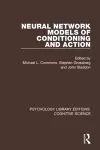
Neural Network Models of Conditioning and Action
3 contributors - Hardback
£150.00
Michael L. Commons is Lecturer and Research Associate in the Department of Psychiatry at Harvard Medical School, Massachusetts Mental Health Center, and
Director of the Dare Institute. He did his undergraduate work at the University of California at Berkeley, and then at Los Angeles, where in 1965 he obtained a B.A. in mathematics and in psychology. In 1967 he received his M.A., and in 1973 his Ph.D., in psychology from Columbia University. Before coming to Harvard University in 1977 as a postdoctoral fellow and then becoming research associate in psychology, he was an assistant professor at Northern Michigan University. He has co-edited Quantitative Analyses of Behavior, volumes 1-11 and Beyond Formal Operations: Late Adolescent and Adult Cognitive Development. His area of research interest is the quantitative analysis of the construction and understanding of reality as it develops across the life span, especially as these elements affect decision processes, life-span attachment and alliance formation, and ethical, social, cross-cultural, educational, legal, and private sectors.
Stephen Grossberg received his graduate training at Stanford University and Rockefeller University, and was a Professor at M.I.T. He is Wang Professor of Cognitive and Neural Systems at Boston University, where he is the founder and Director of the Center for Adaptive Systems, as well as the founder and Co-Director of the graduate program in Cognitive and Neural Systems. He also organized the Boston Consortium for Behavioral and Neural Studies, which includes investigators from six Boston-area institutions. He founded and was first President of the International Neural Network Society, and is editor-in-chief of the Society’s journal, Neural Networks.
During the past few decades, he and his colleagues at the Center for Adaptive Systems have pioneered and developed a number of the fundamental principles, mechanisms, and architectures that form the foundation for contemporary neural network research, including contributions to content-addressable memory; associative learning; biological vision and multidimensional image processing; cognitive information processing; adaptive pattern recognition; speech and language perception, learning, and production; adaptive robotics; conditioning and attention; development; biological rhythms; certain mental disorders; and their substrates in neurophysical and anatomical mechanisms.
John E. R. Staddon is James B. Duke Professor of Psychology, and Professor of Zoology and Neurobiology at Duke University, where he has taught since 1967. His research is on the evolution and mechanisms of learning in humans and animals. He is the author of numerous experimental and theoretical papers and two books, Adaptive Behavior and Learning (1983, Cambridge University Press) and Learning: An Introduction to the Principles of Adaptive Behavior (with R. Ettinger, 1989, Harcourt-Brace-Jovanovich).